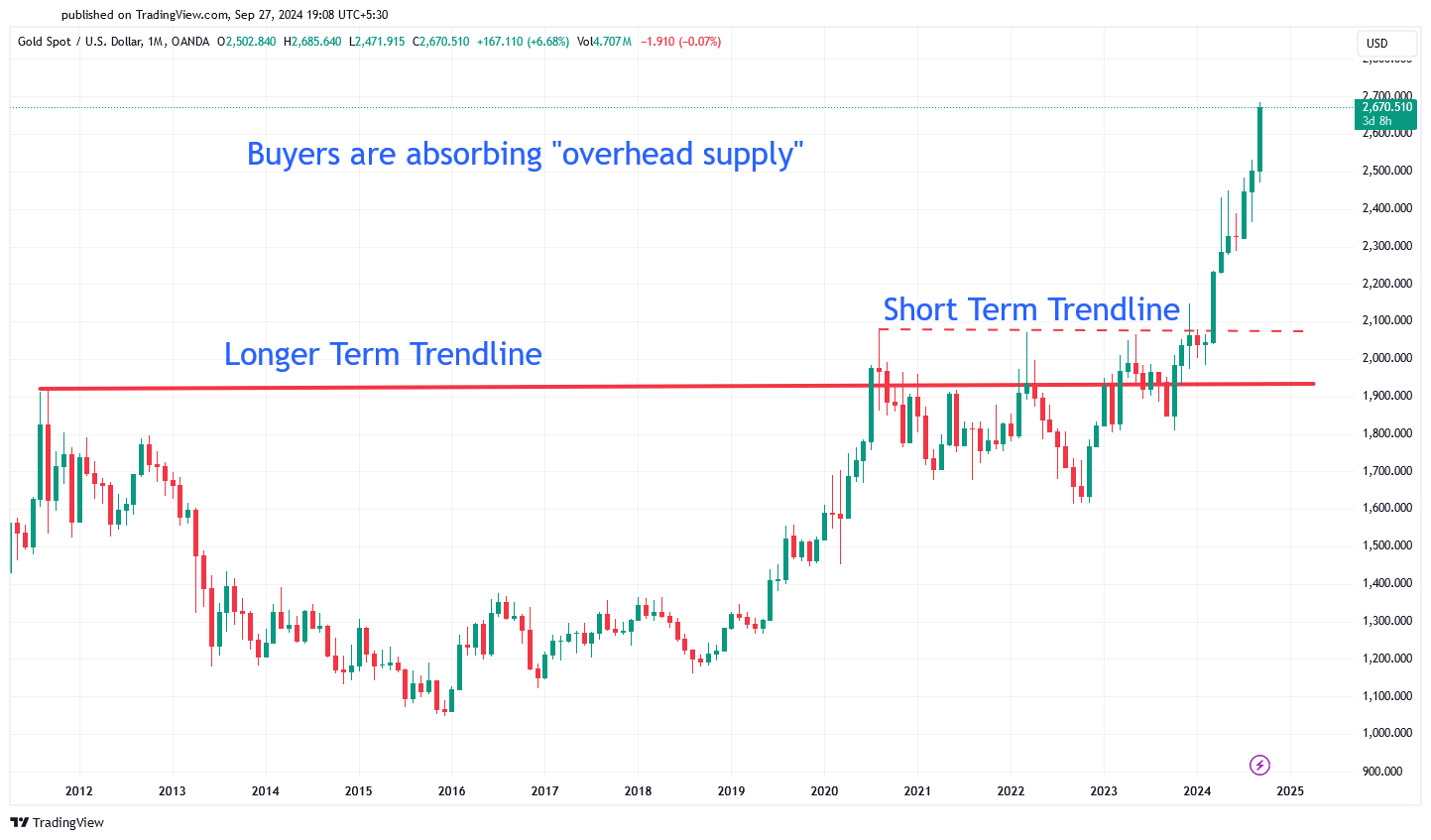Yet the headline of this article seems contradictory and misleading. I assure you it is not. I am as bullish as ever on bullion, and this piece offers a rational look at how financial markets are expected to price assets in 2025.
It is a known fact that prices seldom move in a straight line. There are always traders and investors who feel prices have run up “too much” and want to get off the bus. This is a routine price-discovery mechanism for you, and the process only serves to strengthen the bull market. Confused? Allow me to explain.
The majority of traders and investors are used to thinking small and so invariably take small profits from their trades and investments. Their collective actions can dent the price of any asset in the near term. When they exit, other short-term traders enter with modest but higher price targets, and the bull run continues.
Also read | PPFAS AMC: What its latest five stock picks reveal
A raging bull market or even a supercycle (the strongest kind of bull market there is) occurs when selling by weaker hands is quietly absorbed by stronger hands. These are savvy investors who think of huge price movements over longer periods. Small blips in the price don’t worry them.
Why there could be a correction in gold prices
In my previous piece I wrote about my hypothesis of a procyclical hysteresis in the global financial markets from 2025 onwards. Procyclicality is an economic phenomenon in which asset prices move in the same direction as the overall economy. Hysteresis sets in when prices change direction slowly in the beginning and escalate geometrically over time, gaining size and momentum like a snowball rolling down a hill.
Currently we are in a counter-cyclical phase in which asset prices are moving against the economy, similar to when stock prices skyrocketed during covid lockdowns, when factories and offices were shut.
Also read: How to execute an option spread strategy
The transition from counter-cyclicality to procyclicality is far from smooth, and is confusing for the average retail investor trader who believes, based on the past four years, that stock prices only go up and that you should always ‘buy the dip’. When procyclicality sets in, this trader will be hit by unexpected losses. Since the market will be in hysteresis, these losses will start slowly and build up momentum over time.
At some point on the time/price continuum the average retail investor or trader will no longer be able to take the losses and will start to surrender all long positions, including safe havens such as gold, to meet his margin calls. That’s when gold prices are likely to fall.
How much could gold fall?
That will depend on how much and how quickly the prices of financial assets fall. After all, it’s not a lack of conviction in gold that will cause its prices to fall, it’s financial distress in speculative assets. The higher the distress, the higher the compulsory selling. You can read my views on why procyclicality could take place in 2025 in my previous piece here.
Technical analysis of gold prices
Here’s the monthly chart of gold prices in US dollars per ounce. It spans more than 13 years and tells a compelling, bullish story. After making big bullish moves in the global financial crisis of 2008, gold prices went into hibernation. The peaks are marked by red trendlines. The bold red line tells us the 2011-12 peak acted as a hurdle because many investors who had bought at this level would provide “overhead supply”. When investors stuck at higher levels are waiting for breakeven prices to exit, their selling is called overhead supply.

View Full Image
To absorb the selling by these weaker hands, stronger hands must step in and buy afresh. The new buyers must have bigger pockets, higher conviction and more patience. Sure enough, 2020 saw the overhead supply being absorbed. When covid lockdowns were enforced, risk appetite exploded and financial assets became the flavour of the season. Gold started sliding again as it was seen as a safe haven. New traders wanted to get rich quickly with stocks.
Also read: Trent stock trades at 216 times earnings. Is it still cheap?
Remember that stronger hands had bought in 2020 and thus prevented prices from falling too much. When the second round of buying came in 2024, the dotted trendline was overcome and overhead supply was absorbed.
How much gold prices fall will depend on how many weaker hands have joined the current rally. It is these weaker hands that will rush for the exits first. Is there a way to find out? Yes there is! Read on.
Weak hands, strong hands
In today’s electronic markets, money flows are easy to track and analyse as every investor leaves his footprint in the sands of the market. This is an absolute joy for traders who use statistical models, such as yours truly. To know if the buyer is retail or ‘smart money’, just divide the quantity bought by the number of transactions initiated for that day or week. I call this the ticket size per trade (TST).
A retail buyer may aspire to but cannot buy more than a kilo or two of gold per transaction. If the TST starts becoming larger than average, you can bet the big boys are here! But wait, what if the institutional investors mask their purchases with several small buys? Well, the absolute number of transactions will shoot up. It’s that simple!
Also read: DMart is nearing an all-time high at a PE of 130. Can you still buy it?
So here’s a suggestion: keep some cash in reserve. Should gold prices fall due to distress in financial assets, treat it as manna from heaven. Take a deep breath and buy more gold.
For more such analysis, read Profit Pulse.
Note: We have relied on data from Tradingview.com throughout this article. Only in cases where the data was not available have we used an alternate, but widely used and accepted source of information.
The purpose of this article is only to share interesting charts, data points and thought-provoking opinions. It is NOT a recommendation. If you wish to consider an investment, you are strongly advised to consult your investment advisor. This article is strictly for educational purposes only.
Vijay L Bhambwani is the author of the first official commodities trading guide in India. He designs statistical and behavioural trading models for his family-owned prop trading outfit. He has been in the markets since 1986 and lives in south Mumbai. He tweets @vijaybhambwani and has a video blog at www.youtube.com/vijaybhambwani
Disclosure: The writer and his prop trading organisation have no exposure to gold derivatives contracts discussed here as per Sebi guideline
